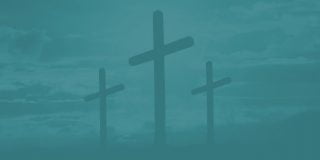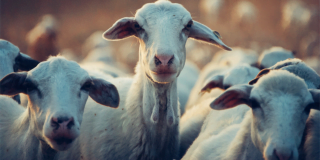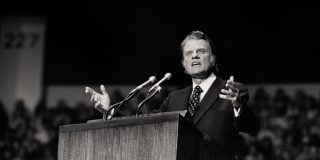If you’re prone to bad dreams or have a penchant for horror movies, then you’ll relate to the Old Testament book of Daniel. It’s full of terrifying dreams, but rather than waking up at the climactic moment of terror, the dreams continue until they find a hopeful resolution. One of them in particular seems important for how Jesus framed his mission.
The dream pictures four unnatural beasts, each one more ferocious than those that precede, each representing a monstrous and grotesque exercise of government. The fourth beast is particularly hideous:
it had large iron teeth; it crushed and devoured its victims and trampled underfoot whatever was left
Daniel describes the experience of oppressed people all over the world and throughout history. They stand almost powerless before seemingly unconquerable forces that wound, steal, imprison, torture, and take with violent impunity.
Then something remarkable happens in Daniel’s dream. As the fourth beast boasts of its invincibility, a court is set up, the Ancient of Days presides as judge, a verdict Is rendered and the beast is slain. Just like that the reign of terror is suddenly over.
A very ordinary figure is now led into the presence of the Ancient of Days. In contrast to the terrifying and monstrous distortions that were the beasts this figure is “like a son of man”, a regular human being. He is granted “an everlasting dominion that [unlike that of the beasts] will never pass away.” The peoples of the world worship him, not because they are forced to but because they want to.
Here is the earth ruled in the way God always intended – the “dominion” granted to humankind in Genesis 1 is not used to destroy, hoard, steal, but to create equity; justice; peace; caring, inclusive community. People, animals, and the earth thrive and flourish.
If the beasts represent the experience of oppressed peoples, the son of man represents hope. Hope that things can be different, that Orwell’s image of tyranny as a boot stamping on a human face forever will prove illusory.
As I survey a world where over 1 billion live in extreme poverty, where millions are trapped in slavery, where multinational corporations illegally spirit hundreds of millions of dollars out of developing countries, where blood stains too many streets and homes; as I survey a planet that we seem hellbent on destroying, I too find myself longing for the world depicted at the end of Daniel’s dream.
This is where Jesus fits. Throughout the Gospels his favourite self designation is that he is a “son of man”. There it is. There is a certain ambiguity. Is he merely being self deprecatory, saying he is just another human being, or is he styling himself as Daniel’s figure of hope, or both? I think the careful reader sees it as both. Jesus, the most fully and completely human of history, is the one who leads the way to the kind of world we long for. He calls us to another way of living, one that favours grace over merit, forgiveness over retribution, service over honour, generosity over greed, the powerless over the powerful, the lowly over the mighty, and love over all. He provides the hope that as we embrace these values now we can experience something of the flourishing God intends, even as the beasts continue to rage, and the hope that a time will come when God will finally bring an end to all the grotesque caricatures of power and replace them with a world marked by power used to ensure the flourishing of this planet and every creature on it.
This is a Jesus I want to follow. He is not the Jesus who beckons me to leave this world behind for the fluffy delights of harp bearing angels singing on clouds, but the Jesus who beckons me to become fully and completely human as I embrace his ways rather than those of the beasts and who offers me the hope of this world becoming all it is intended to be.






